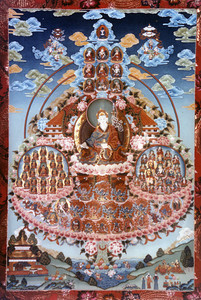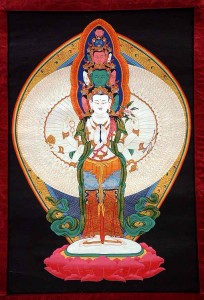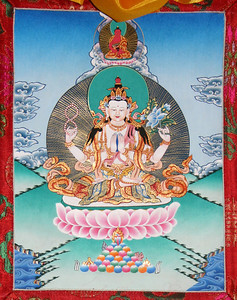
From The Spiritual Path: A Compilation of Teachings by Jetsunma Ahkon Lhamo
Many people don’t like to be challenged. We want our religion to fit nicely into our lives. No untrimmed edges, everything nice. Don’t rock the boat. We want our practice to be conventional—and convenient. But do not expect “nice” in your relationship with your Root Guru. Hope and pray that you get ripped open and rearranged. It should sometimes feel like a train is running over your head. The door opens from the inside. Open the door of your mind, the door of your heart, the door of your devotion. Deepen. To the extent you can allow that to happen, accomplishment occurs.
The Lama should change your life. If you do not wish to change, you are in the wrong religion. So far, what you have given rise to in this life is samsaric, and you must break its hold. You wish to attain realization. Think of yourself as a Volkswagen entering a repair shop. Somehow, you’re supposed to emerge as something that can circle the earth flying. Isn’t that quite a change? But you have to be hungry for it. You have to let it happen. It’s called surrender. And it’s total or nothing.
The Lama should interfere with you. This is also unpleasant news for Westerners. We have convenient, reassuring rules about who can solve our problems, who has access to our lives: parents, psychologists, lawyers, accountants, lovers, family, and so on. But what I’m saying is that you should pray for the Lama to come and upset your life. Expect to have holes poked in it. Expect it to change.
Why should the Lama have the ability to enter your life? What we see, what looks like a person, is only a display. If you are letting a person into your life, you are not practicing Guru Yoga. You should not let an “ordinary” person into your life. But when you understand the nature of the Lama, you realize the Lama to be the condensed essence of all the objects of refuge. The very fabric, the nature of the Lama arises from the mind of Enlightenment. When you practice Guru Yoga, you must also understand that the Lama is none other than your own true face, the nectar of your realization. The Lama is the precious awakening. So you are inviting the precious reality of awakening, the Precious Buddha Nature, that Nature which is beyond acceptance and rejection. You are inviting that nectar to fill your cup.
How many minutes a day should you spend in devotional yoga to the Guru? Can there be too many? Might you go crazy? No. If you spend every waking and sleeping moment with the Lama enthroned upon the lotus of your heart or seated above the crown of your head with your heart and mind in the posture of adoration, love, longing, taking refuge, calm abiding—it is not too much. This is because you are relying on something that is not of the world. It is not samsaric.
You should try to develop a personal relationship with the Guru, but not with his or her personality. Whenever you see or experience something good or beautiful, offer it to the Lama for the sake of sentient beings. “May all sentient beings come to know the nourishment of finding and experiencing complete non-duality with the Guru.” Not only do you include the Lama in every aspect of your life; you dedicate that practice so others will find their teacher. In that way, your connection with your teacher becomes strengthened.
The Lama should be part of everything, everything. You should always follow your Teacher’s instruction, always rely on his/her guidance. When you receive a beautiful gift, mentally offer it to the Lama for the sake of sentient beings. “By the merit of this offering, may all sentient beings be drawn to the Lama’s presence and see the Lama as the ultimate refuge.” Offer the food that you eat: “May all sentient beings feast on the great compassionate intention of the Guru.” As you do this, your food becomes a ritual substance that awakens the Bodhicitta that brings you closer to enlightenment. It becomes holy stuff. It becomes part of your life in the most profound and amazing sense. Guru Yoga becomes the most precious jewel in your life. Everything becomes joyful. Everything becomes a big YES, a big outward-moving experience. There is a lack of contraction in your psychology. And on a deeper level, everything in samsara is transformed into the path. This practice, I can tell you from my heart, is a feedback loop. It is never an energy that merely goes out. It comes back a million fold. The more you become absorbed in your Guru Yoga practice, the happier, the more nourished you will be. The feeling is that of strength, of calm, of coming home.
From the depth of my heart I pray, gathering together whatever virtue I have accumulated, in the three times. This I offer to the Supreme Lord, Guru Padmasambava. May you all, every sentient being, attain the bliss of non-duality, and joyfully awaken to see the true face, the Great Lord of Light, the Root Guru. Lord Guru, rest upon the lotus of our hearts, that we may at last know happiness.
© Jetsunma Ahkön Lhamo








